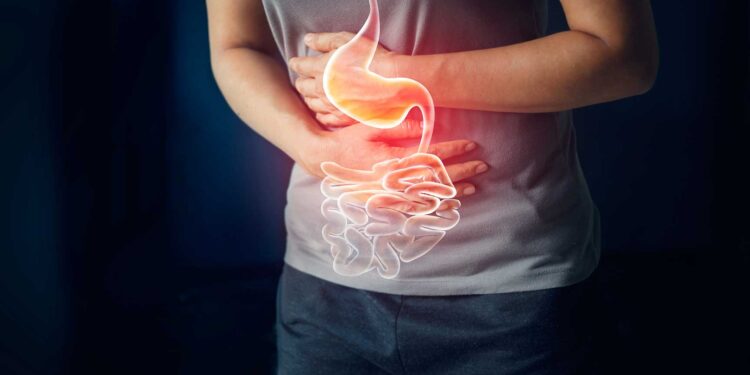Alcoholic gastritis is the inflammation of the stomach that is induced by alcohol. If you have gastritis, you will have a burning sensation in your stomach, which is a symptom of gastritis.
KAMPALA, UGANDA | NOW THEN DIGITAL — Alcoholic gastritis is a medical condition that results from a combination of alcohol consumption and inflammation of the stomach lining. This article provides an overview of the condition and its relationship with alcohol.
- Alcoholic gastritis encompasses a wide range of diseases that cause inflammation in the lining of your stomach. Its name comes from the fact that it is associated with excessive alcohol consumption.
- A good diet and plenty of sleep can help treat alcoholic gastritis symptoms. Your diet can help heal the lining of your stomach and reduce inflammation.
- You can also use antacids to neutralize stomach acids and alleviate the symptoms. Avoid stress as it can make the condition worse. Relaxation is essential for your body.
- You might also be interested in: The 18 healthiest high-fiber foods for your digestive system.
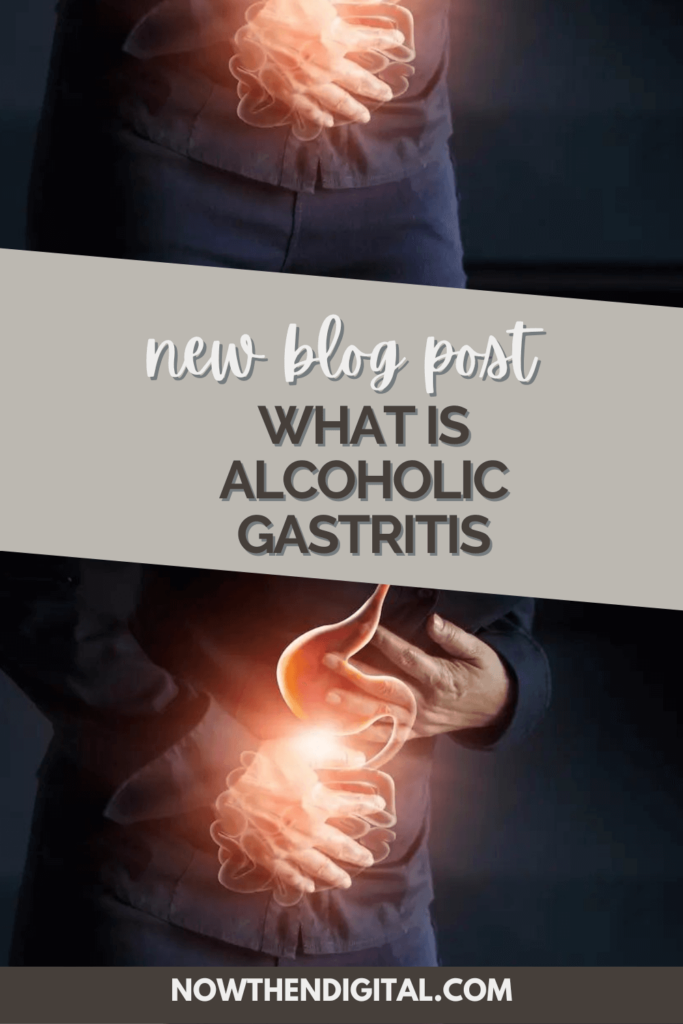
Symptoms
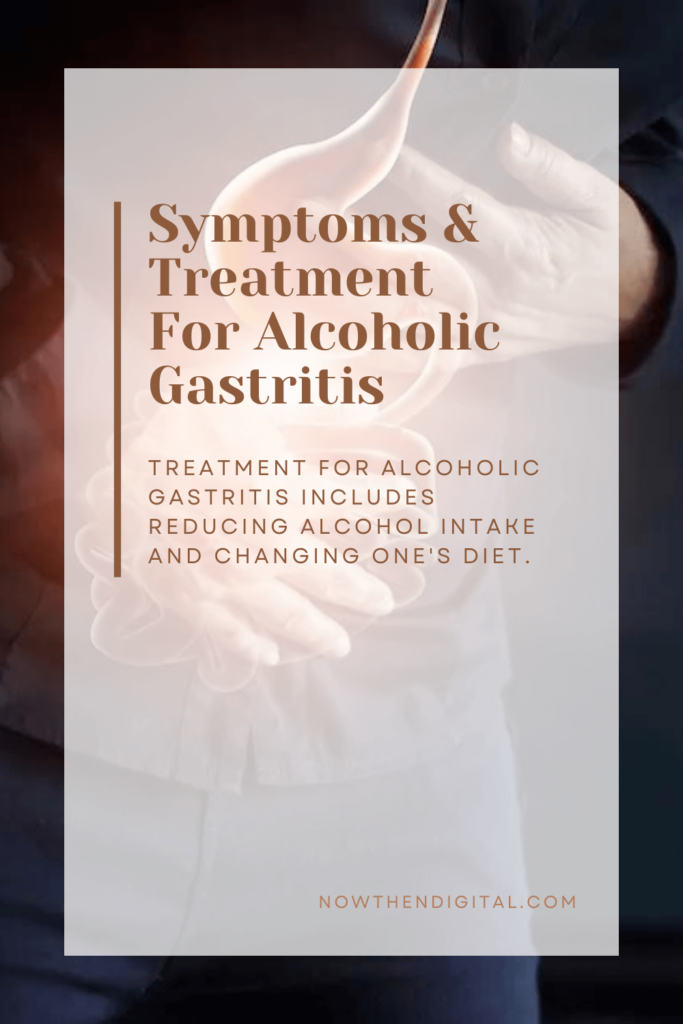
Alcoholic gastritis is a condition caused by an infection with Helicobacter pylori. A doctor can diagnose alcoholic gastritis by running a series of tests. These tests include a physical exam and medical history.
They also use x-rays to check for blockages and ulcers. A urine test can also detect the presence of the Helicobacter pylori bacteria.
Symptoms of alcoholic gastritis may be mild or severe. Severe cases may result in bleeding of the stomach lining or ulcers. These ulcers can be life-threatening if untreated. They can lead to severe gastrointestinal bleeding and can require invasive procedures or even a blood transfusion.
Acute gastritis is characterized by an intense ache in the upper abdomen and sometimes internal bleeding. This condition can also lead to peeling or burning of the stomach lining. It is usually associated with alcohol addiction.
It can also affect people who eat spicy foods. Probiotic supplements can help relieve the symptoms of alcoholic gastritis and prevent the condition from progressing.
Alcoholic gastritis symptoms may present immediately or over time. It can lead to other health problems, including bleeding, ulcers, and bacterial infections.
The symptoms of alcoholic gastritis may range from mild to severe. It can be caused by a number of reasons, including heavy alcohol consumption or genetic conditions.
Chronic alcohol abuse is the leading cause of alcoholic gastritis. Alcohol reduces the production of stomach acid, making it harder to destroy harmful bacteria. Infections caused by Helicobacter pylori are associated with chronic alcoholic gastritis.
Some medications, such as nonsteroidal anti-inflammatory drugs and over-the-counter drugs, weaken the stomach’s mucosa, and can make the condition worse.
Alcoholic gastritis is an extremely dangerous condition. If left untreated, it can lead to internal bleeding and recurrent ulcers. The condition can even damage the liver and pancreas.
Therefore, if you are a heavy alcohol drinker, it is important to see a doctor as soon as possible. The sooner you seek treatment, the sooner you can begin feeling better. But if you have experienced symptoms of alcoholic gastritis, alcohol consumption should be cut down drastically.
In addition to changing your diet, it is also important to get plenty of sleep. Proper rest will help your stomach heal and reduce inflammation. An antacid may also help neutralize acid and relieve the symptoms of alcoholic gastritis.
You may also want to reduce your stress level. Chronic gastritis can be a life-threatening condition and may even require surgery.
Causes
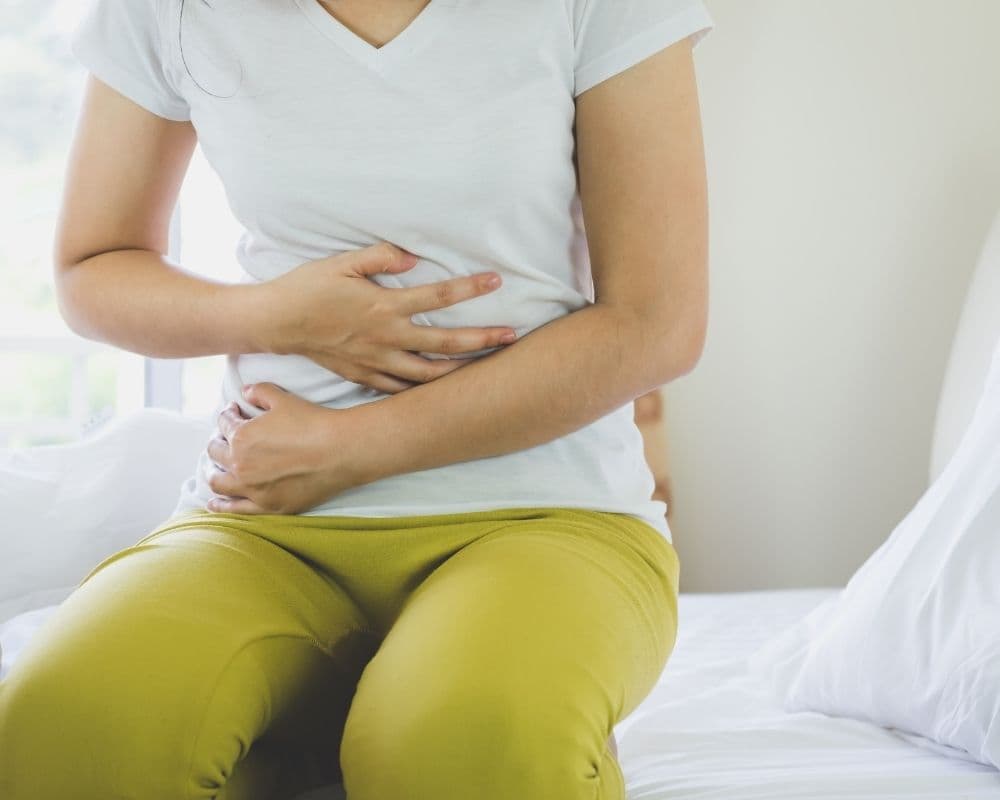
Alcoholic gastritis is a condition in which the lining of the stomach becomes damaged. This lining is a vital protection for the digestive system.
However, alcohol can erode this lining and cause inflammation. This can lead to ulcers, bleeding, and pain. Other causes of alcoholic gastritis include stress, infection, and certain medications.
Symptoms of alcoholic gastritis include pain in the stomach, bloating, and a feeling of fullness. The condition can also lead to blood in the vomit or feces. These conditions are a medical emergency, and you should contact your doctor immediately if you suspect you have alcoholic gastritis.
The first step to treating alcoholic gastritis is to reduce your alcohol intake. Stopping drinking alcohol is very effective in treating the condition and restoring normal stomach function.
If the condition is chronic, it can lead to bleeding in the stomach ulcers. Alcoholism treatment centers are available to help alcohol-affected individuals with this condition.
A doctor can diagnose alcoholic gastritis through a series of tests. A physical examination and a detailed history will help them determine the underlying cause of the condition.
A specialized test known as an endoscopy can be performed to see the inside of the stomach lining. During this procedure, your healthcare provider will insert a thin tube with a camera into your stomach. Blood tests can also be performed to confirm the diagnosis.
Chronic alcoholic gastritis occurs when the mucosal layer of your stomach is damaged. This makes the stomach more susceptible to gastric HCl and makes the symptoms more severe.
If alcohol consumption is not reduced or prevented, it can lead to recurrent heartburn, ulcers, and even liver damage.
Alcohol-induced gastritis can occur short-term or long-term.
The long-term effects of alcoholic gastritis depend on several factors. Alcohol-induced gastritis is rare but can be very serious. People who drink heavily are more likely to develop the condition than people who do not drink.
Besides triggering symptoms, alcohol can also erode the lining of the stomach. As a result, it is important to limit alcohol consumption and stay away from food high in sugar and fatty content.
Treatments
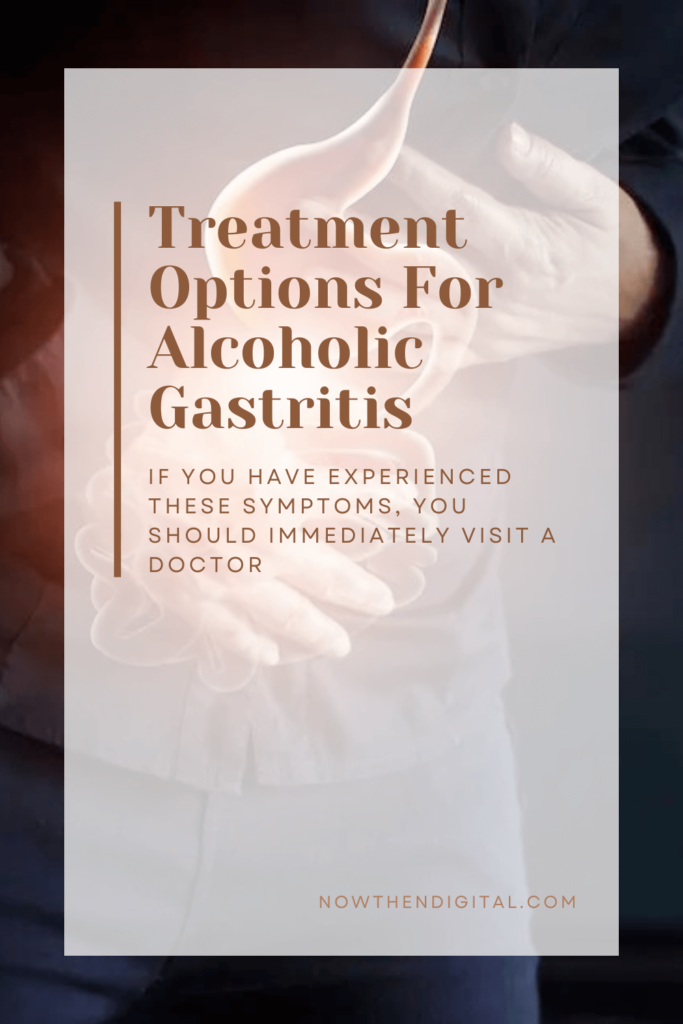
The first step in alcohol gastritis treatments is to assess the symptoms. There are several treatment options available. These include inpatient and outpatient rehabilitation, which focuses on therapy and education for alcohol abusers.
Some alcoholism treatments may also target co-occurring conditions such as depression, PTSD, and chronic pain. There are also toll-free helplines, which are available 24/7.
Alcoholic gastritis is a complication of alcohol consumption. Treatment is dependent on the severity of the symptoms and the cause.
If the symptoms persist or worsen, doctors may recommend a change in diet or stopping drinking alcohol. In some cases, a test to detect Helicobacter pylori is necessary. This involves drinking a white metallic solution to obtain a sample of the bacteria in the stomach lining.
Patients with severe symptoms may also require an endoscopy, which involves putting a small camera down the throat and into the stomach to view the lining. A breath test or stool sample may also be used to determine if there is an infection.
Gastritis is an uncomfortable condition that causes continuous pain and a bloated feeling in the abdomen. It can also lead to more serious conditions, including Ulcers.
People who have gastritis must reduce or stop drinking alcohol as soon as possible. The symptoms of gastritis often become worse over time.
Alcoholic gastritis treatments include the use of antacids and proton pump inhibitors to control acid secretion. Changing diet may also help to heal the stomach and restore its function.
Depending on the severity of the condition, a doctor may prescribe antibiotics or probiotics.
There is no one specific cause of gastritis, but alcohol can erode the stomach lining. This makes it more susceptible to acidic and inflammatory foods.
Symptoms of gastritis resulting from alcohol consumption can range from painful discomfort to severe ulcers. If left untreated, alcohol can lead to a number of other serious health problems.
Chronic alcoholic gastritis is a more severe condition that results from a breakdown of the mucosal layer of the stomach. It can cause stomach ulcers and heartburn, and recurrent episodes can even damage the pancreas and liver.

Prevention
The main way to prevent alcoholic gastritis is to avoid alcohol. This disease is caused by a specific type of bacteria, Helicobacter pylori. These bacteria are found in the tissues of the stomach and esophagus.
To diagnose gastritis, your doctor will analyze your medical history and analyze your personal behavior. He or she will also perform a physical exam to check for signs of gastritis.
If you have symptoms, your doctor may recommend stopping alcohol and other alcohol-containing beverages. In some cases, the doctor may recommend taking an aspirin or NSAID as a preventive measure.
A doctor may also perform a blood test to check for symptoms. Blood tests can reveal if you’re bleeding inside your gastrointestinal tract or have other illnesses.
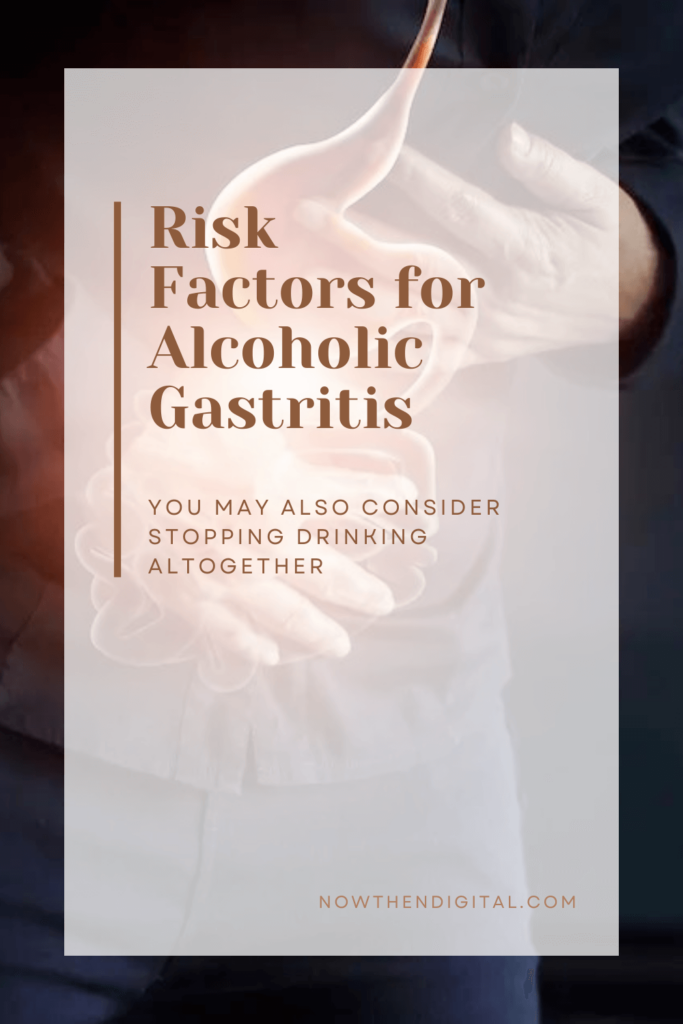
A doctor may also perform an endoscopy to examine the lining of your stomach. This procedure is done by inserting a thin, lighted tube through your mouth into your stomach.
The most effective way to prevent alcoholic gastritis is to reduce your alcohol intake. Although moderate alcohol consumption is not necessarily bad for your health, it can aggravate gastritis.
You should also maintain a healthy diet and limit your intake of anti-inflammatory drugs. If you are unable to cut out alcohol altogether, your physician can recommend antacids and other treatments.
Acute and chronic gastritis are two types of inflammation of the lining of the stomach. In acute gastritis, digestive acids attack a weaker layer of the stomach lining. This causes pain and swelling.
Typically, the inflammation will subside within two weeks. However, if you drink alcohol often, chronic gastritis can set in and take a lot longer to heal.
Despite these symptoms, alcoholic gastritis is not always noticeable and may go unnoticed. The condition may also occur without warning. If left untreated, chronic gastritis can cause more serious problems.
To prevent alcoholic gastritis, cut down or quit alcohol entirely. However, quitting alcohol is not an easy task.
Various other factors can aggravate gastritis, including smoking, eating spicy food, and non-steroidal anti-inflammatory drugs.
Drinking alcohol also irritates the mucous membranes that line the stomach, making it vulnerable to harmful bacteria. Eventually, alcohol-related gastritis can progress to ulcers.
Don’t forget to share our article on ‘alcoholic gastritis’ if you liked it.
You’re reading nowthendigital.com — which breaks the news about Uganda, Kenya, Nigeria, South Africa and the rest of the world, day after day. Be sure to check out our homepage for all the latest news, and follow NOW THEN DIGITAL on YouTube, Google, Web Stories, Google News, Medium, Twitter, Reddit, Pinterest, Linktr, Buy Me a Coffee, and Flipboard to stay in the loop.
We would appreciate it if you could let us know if any of our content is inaccurate or outdated at press@nowthendigital.com.
Reference
- https://www.mayoclinic.org/diseases-conditions/gastrointestinal-bleeding/symptoms-causes/syc-20372729
- https://www.webmd.com/digestive-disorders/h-pylori-helicobacter-pylori
- https://lifestyleuganda.com/can-you-die-from-stomach-ulcer/
- https://lifestyleuganda.com/heartburn-symptoms-treatment/


